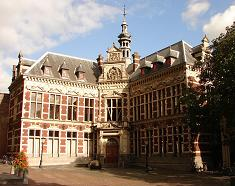Speaker
Rafal Maciula
(Institute of Nuclear Physics PAN)
Description
I will discuss production of open charmed mesons in proton-proton collisions at the LHC. The cross section for inclusive production of $c \bar c$ pairs is calculated in the framework of the $k_{\perp}$-factorization approach. Taking wide range of $x$ values necessary for the calculation we use and test several unintegrated gluon distributions from the literature. Some of them include effect of small-$x$ saturation and fullfil Balitsky-Kovchegov evolution equation. Theoretical uncertainties of the model related to the choice of renormalization and factorization scales as well as due to the quark mass are also discussed. Results from the $k_{\perp}$-factorization approach are compared to NLO parton model and FONLL predictions. The hadronization of charm quarks is included with the help of different fragmentation functions found for the production of charm in $e^+ e^-$ collisions. Sensitivity of our predictions to the choice of the model of fragmentation is also shown. Inclusive differential distributions in transverse momentum and (pseudo)rapidity of several charmed mesons ($D^0$, $D^{\pm}$,$D^{*\pm}$,$D^{\pm}_{S}$) will be presented and compared to recent results of the ALICE, ATLAS and LHCb collaborations. Furthermore, I will also consider production of different pairs of charmed mesons ($D^0 {\bar D}^0$, $D^0 D^-$, $D^+ D^{-}_{S}$ etc.) in the unique kinematics of forward rapidities in the LHCb experiment. Kinematical correlations in azimuthal angle $\varphi_{D\bar D}$ and invariant mass $M_{D \bar D}$ distributions will be presented and compared to LHCb data.
Author
Rafal Maciula
(Institute of Nuclear Physics PAN)
Co-author
Antoni Szczurek
(I)
